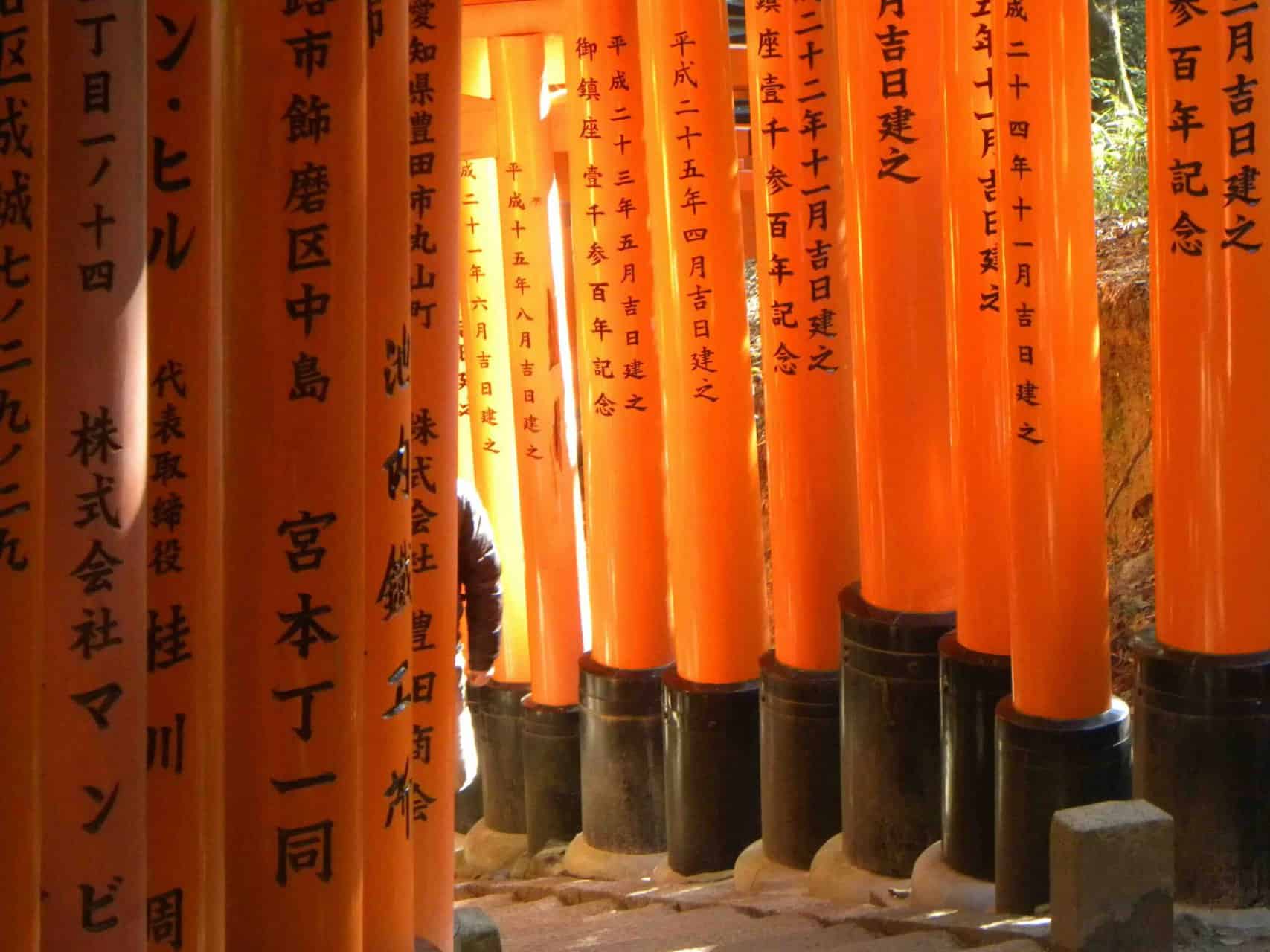Travellers of the Month: Cam & Ana from Nomadicgregors
15 min readWelcome to Traveller of the Month! Each month I’m featuring a fellow world traveller on Teaspoon of Adventure to share their stories and travel wisdom with all of you. This month,...
The post Travellers of the Month: Cam & Ana from Nomadicgregors appeared first on Teaspoon of Adventure.
Welcome to Traveller of the Month! Each month I’m featuring a fellow world traveller on Teaspoon of Adventure to share their stories and travel wisdom with all of you.
This month, I have the pleasure of featuring not one, but two, travellers of the month!
Without further ado, let’s meet April’s featured travellers: Cam (he/him) & Ana (she/her) from Nomadicgregors!
And if you missed March’s featured traveller, get to know Saskia here!
Please introduce yourselves. What is your travel story?
I (Cameron) got into travel back in 2006. I grew up in a small town in Washington State in the US (1,500 people – largest town for 45 min) when a friend invited me to visit him in Hong Kong, where he lived and taught.
I was 20, and it was my first time leaving the US. I saw Hong Kong, Thailand, and Cambodia. I fell in love with travel, and as I knew I wanted to be a teacher, I had found the best of both worlds.
Since then, I’ve visited numerous countries, but became a teacher and have taught English in Russia, 4th grade in the Dominican Republic, China, Korea, Hawaii, and now Grade 6 history in Saudi Arabia.
I’ve visited over 30 countries, lived in 6 full-time, and had the opportunity to teach students from around the world!
My wife and I currently travel primarily for fun. As educators who live abroad, we have plenty of time to travel, though often at peak travel times (summer, winter/Christmas, spring break, etc.).
We no longer travel cheaply and focus on sightseeing and local experiences. We love to have small itineraries in places to see what we want while taking time to wander and discover the places the locals frequent.
We also unabashedly love hotels, particularly Marriott (at least outside North America).

When did you start your travel blog and what sort of stories do you share there?
I started my blog in 2010 when I moved to Russia as a Fulbright scholar to teach English.
Since getting married, my wife and I started writing together. It began as an online journal detailing our experiences abroad and the ups, downs, highs, lows, and culture shock experiences you have when you travel, have an apartment, and fully live in a new place.
In the last year or so, we’ve started adding more to our blog in the hopes of sharing our knowledge and experience. While still detailing our day-to-day experiences, we also now offer posts, podcasts, and how-tos on how to get into international education (where we have 16 years combined experience) or advice and pathways for those looking to become an expatriate.
What do you do when you’re not travelling or writing about travel?
When not blogging, we do teach full-time. We are both middle school social studies teachers, currently in Saudi Arabia. We teach students from all around the world.
As we do live abroad, sometimes our travel is spent taking time to go back and visit family, though this is still travel for us often as our families live in the US and the Dominican Republic.
If you had to sum up your travel ethos in one phrase, what would it be?
Be open-minded.
I (Cameron) grew up in a very small rural town. When you grow up in a town like that, one that is almost exclusively white and conservative, you a) don’t realize just how much of the world you miss out on, from new foods to languages to world events and to, most importantly, ideas because you have no access to it and because most people don’t want anything to do with it and b) how quickly those around you can shut down others for completely unwarranted reasons be it race, gender, sexual orientation, or simply thinking differently.
Growing up in this environment, I didn’t realize not just what I was missing but, more crucially, how many other ways of approaching life there were.
So, when I first left the US (at the age of 20), it was a rebirth. I saw sights, heard sounds, and smelled smells I never could have imagined. And then, when I finally moved to another country, I realized how much the idea of traveling went beyond just culture but into the realm of ideas and critical thinking.
Did I love my country? Sure, but many other cultures approached problems from a different perspective, and their solutions worked just as well, if not better. I also met other travelers who were open to these ideas.
Traveling pushed me to be more open-minded to the world around me and, in turn, made me more empathetic and accepting of everything.
So, as a teacher and a traveler, one trait I value most or try to instill or inspire in others is to be accepting of new ideas, people, and cultures. You’ll learn more than you could have imagined, and you will grow as a person and grow to be someone who makes the world a better place.

What is your most unique travel moment?
While teaching in Russia, I lived in Elista, Kalmykia, a small city of about 10,000 people. I was getting ready to visit my girlfriend (now wife) in the Dominican Republic for Christmas.
If you’ve ever been to Russia in the winter, it’s both incredibly beautiful and really, really cold! So, taking a trip to the Dominican was very much going to be a welcome change.
I woke up at around 4:30 am on Christmas day to go and catch a bus (Christmas isn’t a big holiday in Russia – it’s Новый год or New Year’s) to Volgograd. The small bus took approximately 4.5 hours to reach its destination, and I found myself waiting at the train station.
My train arrived, and I hopped on and found my car. Now, most trains in Russia are not high-speed. They’re sleeper cars you share with 2-3 other people. I found my bed, which was myself and two other women, one with a small daughter and an empty bed. I put my stuff down and went to take some photos of the landscape as we cruised out of Volgograd.
However, it did not take long before a somewhat intoxicated Russian man slapped me on the shoulder and took me to the restaurant car with him. He had sought me out as he was the missing bunkmate from my sleeper car.
My Russian was decent at this point, but in his drunken state, this man was convinced I was Russian. He treated me to plenty of vodka with beer chasers and mushrooms with mayonnaise salad (yuck).
After a couple of hours of slow drinking, I was ready to extricate myself from the situation and get some rest. I stood up to tell my ‘friend’ I was leaving, and he decided to shove me back down and yell at me, letting me know I’d do no such thing. He was a bit upset as I finally managed to explain that I wasn’t Russian.
An hour or so passed, and I needed to use the restroom. I convinced him to let me go, only to return to find him gone. I’m not sure if I was speaking perfect Russian or if it was the alcohol, but the waitress let me know my friend had left. I let her know he wasn’t my friend and made it back to my bed and fell asleep.
I woke up at around 7 am and learned we were making a stop about two hours outside of Moscow. My drunken friend was gone but showed up right before we took off again with a 2-liter bottle of warm beer and some dried fish.
The fish was shared amongst all, but the beer was shared between the other man and me. Now, I like beer as much as the next person, but 7 am warm beer is not the breakfast of champions or even the kind of hair of the dog one hopes to have.
The train takes off, and we start going to Moscow again. The snow was high, and the conductor announced we’d be arriving shortly. Before we could arrive, however, the train stopped. It had broken down 20 minutes outside the city and 35 minutes from the station.
After an hour, people started grabbing their belongings and hiking to the nearby highway to hitch a ride. Those of us in my cart stayed behind, and it wasn’t long before my ‘friend’ discovered he had brought another 2-liter bottle of beer when he boarded the previous day.
And so, during our four-hour delay, I was treated to yet another warm beer experience!
After the long delay, the train moved, and we reached our station. I found a cab and went to the hotel I was staying at near Sheremetyevo Airport. My flight was at 10 am, so I woke up at around 3:30 am to the news that my flight had been canceled.
During the night, there’d been approximately 4 inches of freezing rain, so all flights had been canceled. I decided to go to the airport anyway to try to reschedule.
After standing in line at Lufthansa for an hour, I managed to get rescheduled for a flight the next day. I had a day to kill with no place to stay. I was not alone in this as the airport was full of travelers waiting to catch a flight. To Sheremetyevo’s credit, the restaurants were open all night for the many of us hanging around.
The next day arrived, I returned to the airport and it was absolute chaos. People pushed and shoved, and those with no baggage would slide past only to reveal they had 4 or 5 passports for themselves and their friends. Their friends would then have to part the crowd with their bags to go check in.
I finally made it to the counter with a couple of fellows from Belarus. As we checked in, a Russian woman made it to the counter and asked if she could skip the line because it was her birthday. The woman behind the counter said no, but she kept asking.
After about the third time, one of the Belorussian guys turns to her and says, “We’re all trying to check in; no one cares that it’s your f*ing birthday, f*k off.” She took this as a hint to leave and left.
I managed to get my ticket and discovered I’d been upgraded to first class. After another short wait, I finally boarded my flight, my first time in business or first.
After spending the night in the airport, I was tired and smelly, and the woman sitting next to me gave me a disdainful look. She seemingly knew I wasn’t meant to be sitting in such a nice seat, but I didn’t care.
I eventually made it to the sunny Dominican Republic, where I had a wonderful vacation and proposed to my girlfriend!

How do you overcome homesickness on the road?
This is an interesting question because we aren’t just travelers but full-time expatriates, so we spend anywhere from 9 to 11 months overseas in the same location for several years.
At this point in our lives, it’s not about being homesick. We have missed weddings, births, and unfortunately, occasionally, a death. Neither one of us has celebrated a birthday in our home country in over a decade.
The only major US holiday we experience in the US is, sometimes, the 4th of July. These things are all, after a time, minor in our experience. It’s the people you miss.
As I (Cameron) am an only child with aging parents (nearing 80) who live alone, the fear of not being there for them causes me overwhelming guilt at times. Sometimes, it’s because I worry about something happening to them. Other times it’s because I feel guilty about not spending more time with friends and family.
For Ana, it’s the same. It can feel as though our family and friends back home are the ones bearing the brunt of our life choices. And that guilt can weigh heavy on you.
But Ana and I always remind ourselves of this: It is our life. We deserve to do what makes us happiest.
It doesn’t mean we always get to do what we want but would moving back home to make others happy make our lives better? Surely not. We might rid ourselves of the guilt of leaving the ones we care about behind, but would almost certainly pick up new guilt about not being true to ourselves and living the life we want.
Does this reminder always make us feel better? No. But it’s where we start when these feelings set in. Before we get too upset, we reflect on our lives and on our travels and remember there is purpose in what we do, both as travelers and educators, and the burden lessens, even if only slightly.
What do you want to inspire other travelers to do?
As teachers, our goal is to inspire our students to be open-minded, to think critically, to problem solve, and to be independent. Much of what we hope to inspire other travelers to do is the same.
Growing up in a small town where a city like Seattle was about as far as people went, my goal is to inspire others to take a leap and explore something new. In travel and living abroad, we not only learn more about ourselves but gain new perspectives about other cultures and livelihoods, and perhaps most importantly, about where we come from.
We hope to help others realize the benefits of visiting new, and hopefully somewhat less trodden, places that can make you a better person.
We also want to inspire others to leap, not just to travel but to move abroad. Teaching can be an interesting career in the US (and other places), and our goal is to teach others about the pros and cons (but mostly pros) of moving to a new country to teach from the financial to the personal aspects.
We also want to help those who do not teach to move abroad, find the lifestyle that will allow them to do so, and manage the ups and downs of moving and living in a new country.
If you could live abroad, where would you live?
Having already lived abroad in several different countries, should we be able to choose to live anywhere, our top spots would undoubtedly be Hong Kong, Japan, or Austria.
Hong Kong is a city we know and love well, from the food to the joys of all the amazing things you can do. Japan is a country that is incredibly varied, and each day feels like exploring some hidden aspect of their culture and, perhaps to some extent, the human psyche.
As for Austria? Well, rarely is a place so well run (though maybe Japan) filled with so much history and so close to so many other wonderful places.
Also, we’d probably choose anywhere with a Formula 1 Race!

Do you have any goals for your travel blog?
We are hoping our blog will be enough for us to take a sabbatical from teaching.
We are going to be offering courses in the coming months and years specifically revolving around international education, as we hope to provide insight and guidance as to how to get into teaching abroad.
In the next year or so, we want to create a coaching course to help teachers, either abroad or at home, find balance in their work as teachers, as education is an incredibly mentally demanding job. We are also planning to offer advice to future travelers and expats.
Much like like overcoming homesickness, travel burnout for us is less burnout but more culture shock, or rather part of culture shock. For those unfamiliar with culture shock, it generally has three main stages people experience:
- Stage 1: The Honeymoon Phase, where everything is great and amazing.
- Stage 2: What I call the Rage Phase, where the slightest little thing can set you off and make you hate everything about where you’re living. Or you might feel homesick and really miss everything and everyone. No matter what, it’s not a fun place to be in mentally.
- Stage 3: The Settling In Phase, which is where you’ve gotten used to life abroad and you have a routine and mostly good days. The honeymoon phase is gone, though there are still occasional great days along with some bad Stage 2 days.
So for us as expats, we don’t get too much travel fatigue, and while we generally settle into our new homes (we’ve lived full-time in 6 different countries), those Stage 2 days do crop up. It’s easy to be hypercritical of a place, a people, or a culture when this happens. So how do we cope?
Like anything else, we believe communication is key. We, as a couple, let each other know we’re in a Stage 2 day.
From there, we do our best to engage in activities designed to draw us out. Sometimes, that might mean going out and doing something we really enjoy. Other times, it can mean staying home and watching a movie or reading, just something to help take your mind off the anger or depression you might be feeling.
As we have lived overseas long enough, we also know that these moments aren’t representative of who we are or how we feel about where we live. We vent or open up to each other, and from there, we can begin to pull ourselves out of the depths of despair that settle in during our bad days as expatriates.
Where would you recommend someone go on their first trip out of your home country, the US?
For those from the US, or even Canada or Western Europe, I recommend taking a trip to Asia.
Any country will do. Asia offers so incredibly much to enjoy and experience and is so drastically different from Western culture and life. If you’ve never been abroad, certain things may come as a shock, but the rewards are worth it.
From the architecture to the food to the general culture, you’ll be rewarded with new sights, smells, tastes, and experiences you would be hard-pressed to find back home.
If I had to pick a country, I would recommend Japan or Thailand. Never will you meet friendlier people in either country and both have so incredibly much to offer. Both countries are incredibly diverse, vivid, and full of life and action.

What parts of travelling and blogging are you an expert on? What parts of travelling and blogging do you want to improve on or learn more about?
We are experts when it comes to moving abroad. We’ve lived in 6 different countries full-time (i.e., at least two years) and are well-versed in adjusting to new people, cultures, and jobs in new and unfamiliar places.
As such, our blog and podcast contain information about moving, packing to move abroad, and dealing with culture shock. We’ve also become much better at detailing our experiences as we travel.
We are also experts when it comes to teaching overseas. Not just teaching English but working as a full-time educator in a K-12 school where your language of instruction is English.
We both currently work as middle school social studies teachers to students from around the world. We want to inspire other teachers who want to leave their home countries and explore to begin this journey of teaching abroad, where not only can you travel more frequently but are almost always better compensated for the incredibly hard work that we know educators put in.
We’d like to improve our how-to guides on visiting cities. We want to provide people with opportunities to experience the best of any place they visit.
How has your travel style changed and evolved over the years?
Over the years, we have gone from budget travelers, almost always staying in the cheapest places we could find and opting for the cheapest flights we could find, to a finer style of travel.
As we are nearly 40, we stay almost exclusively in hotels, particularly Marriott, as we find that living overseas, the loyalty to one brand offers us considerable perks when sticking with one hotel chain.
We are also loyal, or as loyal as we can be, with airlines, choosing airlines we prefer, opting for more direct routes, and always paying for extra legroom on flights over 4 hours.
In other areas, we haven’t changed. Food has never big an overwhelmingly important aspect of our travels and as such, we opt for cheap local food as much as possible (think döner in Germany) with an occasional nicer meal thrown in here and there.
This has come about for several reasons. First and foremost, we have advanced in our careers and are able to afford this. Second, the older we are, the more being comfortable is important as we no longer have the energy we did when we were in our 20s.
We realize this is also a privileged position and one we do not take for granted. We also are much better at financially planning our trips and making sure we can afford each and every one we take.
Lastly, where can we find you online?
You can find us at:
Podcast
Thank you for joining my Traveller of the Month series, Cam & Ana! Head on over to Nomadicgregors to learn more about Cam and Ana’s adventures abroad, including their awesome resources for international teachers and expats.
And stay tuned for May’s Traveller of the Month here on Teaspoon of Adventure!



